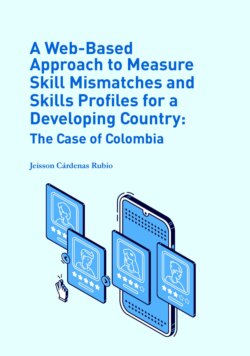Читать книгу A Web-Based Approach to Measure Skill Mismatches and Skills Profiles for a Developing Country: - Jeisson Arley Cárdenas Rubio - Страница 10
На сайте Литреса книга снята с продажи.
ОглавлениеList of Tables
Table 3.1. Characteristics of the Colombian workforce
Table 4.1. OECD quality framework and guidelines
Table 4.2. Possible sources that affect the quality of information from job portals
Table 4.3. Advantages and disadvantages of data sources for the analysis of labour demand
Table 4.4. The main differences between the Cedefop and the Colombian vacancy projects
Table 5.1. Average number of job advertisements and traffic ranking for selective Colombian job portals
Table 5.2. Job advertisement structure comparison within the same job portal
Table 5.3. Evaluation of job portals
Table 5.4. Job portals and their main characteristics
Table 6.1. Job description
Table 6.2. Basic data structure
Table 7.1. Total number of vacancies and job positions
Table 7.2. Top 20 most demanded occupations in Colombia
Table 7.3. Distribution of job placements by high-, middle-, and low-skilled occupations
Table 7.4. New job titles
Table 7.5. Top 20 most demanded skills in Colombia
Table 7.6. Skill groups demanded in Colombia
Table 7.7. Twenty new or specific skills demanded in Colombia
Table 7.8. Job placements by sector
Table 7.9. Yearly distribution of vacancies and job positions
Table 8.1. Occupational structure by education
Table 8.2. Top 10 occupational labour skills in demand by sector
Table 8.3. Top 10 occupational skill categories
Table 8.4. Monthly distribution of new hires, 2016-2018
Table 9.1. Occupational distribution of Colombian workers
Table 9.2. Occupational distribution of jobs sought by unemployed people in Colombia
Table 9.3. Occupations with higher informality rates
Table 9.4. Occupations with lower informality rates
Table 9.5. Occupations with higher unemployment rates
Table 9.6. Occupations with lower unemployment rates
Table 9.7. Skill mismatch indicators
Table 9.8. Skill shortage indicators and thresholds
Table 9.9. Occupations in skill mismatch
Table 9.10. Most demanded skills for occupations in skill mismatch
Table 9.11. Skills with a positive trend for “Web and multimedia developers”
Table 10.1. OECD quality framework and vacancy data
Table B.1. Example of the content of a scraped database
Table D.1. N-grams based on job titles
Table G.1. Vector representation, example one
Table G.2. Vector representation, example two
Table G.3. Nearest neighbour algorithm (Gweon et al. 2017)
Table G.4. Limitation of the nearest neighbour algorithm
Table G.5. An extension of the nearest neighbour algorithm (Part 1)
Table G.6. An extension of the nearest neighbour algorithm (Part 2)
Table G.7. Comparison between the analysed classification methods
Table H.1. Occupations demanded in Colombia
Table H.2. Occupational distribution of Colombian workers
Table H.3. Occupational distribution of the unemployed in Colombia
Table H.4. Informality rate by occupation
Table H.5. Unemployment rate by occupation
Table H.6. Occupations with positive employment growth, 2010-2018
Table H.7. Occupations with positive real wage trend, 2010-2018
